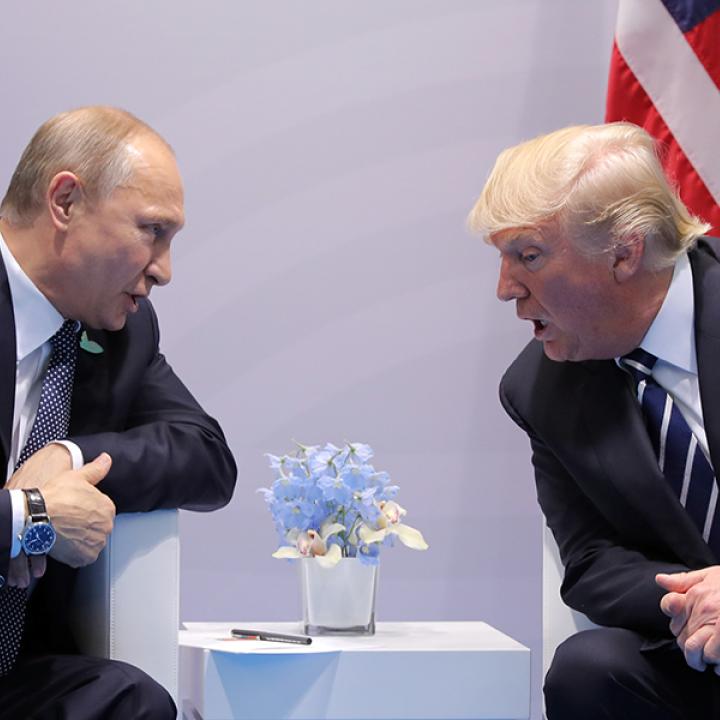
- Policy Analysis
- Articles & Op-Eds
Israel, Iran, Syria and Trump Strategy: The Best Way Forward

Enhanced Russian support for the Syrian regime could dramatically boost risks for Israeli operations, and U.S. intervention alone can shift the calculus.
The Trump administration’s approach to Iran is about exerting maximum pressure and countering Iran’s “malign activities.” While the Europeans, the Russians, and Chinese are pushing back against the administration’s calls for tougher sanctions against Iran, the president can count on support from Israeli Prime Minister Benjamin Netanyahu. He shares the administration’s assessment of Iran and its aggressive behavior in the region.
However, there is an irony here. Israel has been largely left on its own to counter the Iranian effort to consolidate a land corridor through Syria. With Hezbollah and Shia militias from as far away as Afghanistan serving as shock troops for the Assad regime, the Iranians have been embedding themselves and their Shia proxies in Syria. They are developing a military infrastructure in the country that can serve as a platform for Iranian threats to Israel and Jordan. To blunt that infrastructure, its offensive potential and the provision of more advanced weapon systems to Hezbollah and other Shia militias, the Israelis have carried out more than 200 operations against Iranian-related targets in Syria.
So until now, it has been Israel, not the U.S., countering Iran’s “malign activities” in Syria. But Israel may be facing a new situation. Until now, the Russians have largely allowed Israel freedom of action in Syria—a reality due in no small part to Prime Minister Benjamin Netanyahu’s constant management of the relationship with Vladimir Putin. Nine visits over the last two years are vivid testimony of his efforts. But the Russians may be about to change their posture. The Syrian shoot-down of a Russian aircraft and the loss of 15 Russian servicemen may well trigger a change toward Israeli operations. The Russian Defense and Foreign Ministries have said that “blame for the tragedy of the Russian Ilyushin-20 aircraft lies entirely with the Israeli air force and those who made the decision to carry out such actions.” While President Putin seemingly tempered criticism of Israel, calling it “a chain of tragic chance events” and acknowledging that “an Israeli aircraft did not shoot down our aircraft,” the Russian Defense Ministry and the Kremlin spokesman, Dmitry Peskov, continue to make very harsh statements against the Israelis—proclaiming that their planes used the Russian aircraft to mask the Israeli operation.
Although Israel sent a military delegation to Moscow to share all the data on the operation, including the fact that its planes were back in Israel before the Syrians fired their barrage of surface-to-air missiles, the Russian military is not backing off of its charge that Israel and not Syria is responsible for the downing of the aircraft. Moreover, the Russians are taking steps to prevent any future such incident. Defense Minister Sergei Shoigu has now announced not only that the Russians will transfer the “modern S-300 air defense system to the Syrian armed forces within two weeks,” but added that Russia will engage in “radio-electronic suppression of satellite navigation, on-board radar systems, and communication systems of military aviation attacking objects on Syrian territory.” The S-300s and the counter-measures Shoigu announced will, if implemented, make Israeli operations against the Iranians in Syria dramatically more complicated and risky. Given Iran’s determination to embed itself in Syria—reflecting the Supreme Leader’s declaration that Lebanon and Syria are part of Iran’s forward defense—the Qods Forces are bound to transfer more advanced weaponry now, if for no other reason than to see if the Russians will limit Israeli operations.
Can Israel afford not to try to stop new Iranian shipments? Only if it is prepared to live with an Iranian build-up that is likely to include not just advanced weapon systems but also the building of plants to fabricate advanced guidance systems for the tens of thousands of rockets that are now in Syria and Lebanon. Israel, a geographically small country with a limited number of high-value strategic targets, has repeatedly made it clear—especially with its operations in Syria—that it cannot live with such an outcome.
Something has to give. One might expect the Trump administration to step in and try to prevent what might be a dangerous escalation. Historically, there was a ground rule in U.S.-Israel relations: Israel handles the countries in the region, America handles the countries outside the region that might endanger or inhibit Israel. In this administration, Israel has had to handle both—meaning both Iran and Russia.
Now is the time for the Trump Administration to insert itself. President Trump should go to President Putin and say unless you impose an agreed set of limits on what Iran can have militarily in Syria, where it can have it, and what it can and cannot bring to Syria and Lebanon, we will not only back continuing Israeli operations but may feel the need to do more in Syria ourselves.
Putin wants us out of Syria, not in it. He wants to reduce the risks to Russian forces, not see them increase, and he wants to avoid being in the middle of a conflict that could easily escalate. That creates leverage and an opening for diplomacy. Let’s hope the Trump administration seizes it.
Dennis Ross is the counselor and William Davidson Distinguished Fellow at The Washington Institute.
New York Daily News



